Unit6 SectionB(1a-1e)
人教版英语八年级上册Unit6SectionB(1a~1e)教学设计

一、教学目标
(一)知识与技能
本节课为“人教版英语八年级上册Unit 6 Section B (1a~1e)”,通过本节课的学习,学生应掌握以下知识与技能:
1.掌握本节课的核心词汇与短语,如:volunteer, opportunity, at the moment, take care of, make a difference等,并能正确运用到日常生活语境中。
2.学会使用一般现在时与现在进行时描述自己和他人的日常活动,以及志愿工作的情况。
3.能够理解并运用一般疑问句和回答方式,进行有关志愿工作的信息询问和交流。
4.提高学生的听说能力,能听懂并参与有关志愿工作的讨论和交流活动。
(二)过程与方法
在本节课的教学过程中,教师将采用以下方法帮助学生达成学习目标:
1.采用任务型教学法,设计各种真实的语境,让学生在完成具体任务的过程中,掌握目标词汇和语法结构。
3.学生分享自己的见闻和感受,教师趁机引入本节课的主题:“Volunteer for the Environment”。
(二)讲授新知
1.教师通过PPT展示本节课的核心词汇和短语,如:volunteer, opportunity, at the moment, take care of, make a difference等,引导学生跟读并理解其含义。
针对以上学情,教师应结合学生的实际水平和需求,设计富有层次感和趣味性的教学活动,激发学生的学习兴趣,帮助他们克服困难,提高英语综合运用能力。同时,关注学生的情感需求,营造轻松、和谐的学习氛围,使他们在愉快的氛围中学习,不断提高。
三、教学重难点和教学设想
(一)教学重难点
U6 Section B 1a-1e 课件-七年级下学期英语课件(人教新目标)
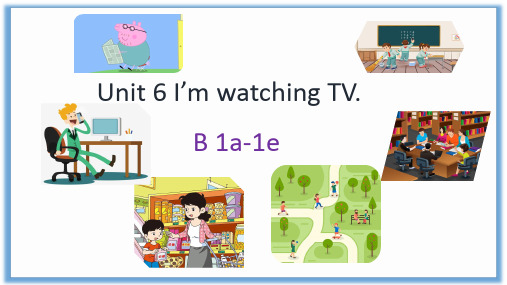
Describe the Pictures Where are Tom and his mother? They are at the supermarket. What are they doing? They are shopping.
Describe the Pictures
in the library in the supermarket
What is he doing? He is talking on the phone.
Describe the Pictures
Where are they? They are at the library?
Are they reading books? No, they are discussing.
The students are reading in the library. The woman is shopping in the supermarket. The man is swimming in the pool.
Pairwork
Is he man swimming in a river?
Pairwork Make conversations according to the pictures.
Tom
A: Is/Are ...V-ing...? B: Yes/No, He/She is/are V-ing.... Jack and Alice
Anna
Lily
Homework
Tom
Unit 6 I’m watching TV. B 1a-1e
Describe the Pictures
Where are the students? They are in the classroom.
Unit6_SectionB(1a-1e)全英版教案
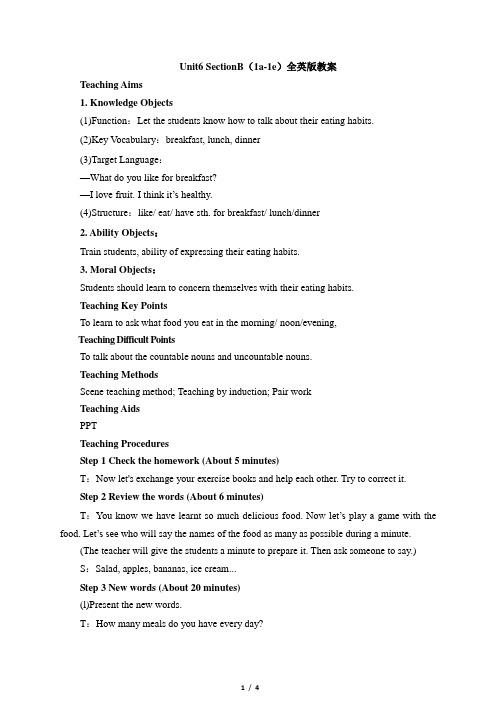
Unit6 SectionB(1a-1e)全英版教案Teaching Aims1. Knowledge Objects(1)Function:Let the students know how to talk about their eating habits.(2)Key V ocabulary:breakfast, lunch, dinner(3)Target Language:—What do you like for breakfast?—I love fruit. I think it’s healthy.(4)Structure:like/ eat/ have sth. for breakfast/ lunch/dinner2. Ability Objects:Train students, ability of expressing their eating habits.3. Moral Objects:Students should learn to concern themselves with their eating habits.Teaching Key PointsTo learn to ask what food you eat in the morning/ noon/evening,Teaching Difficult PointsTo talk about the countable nouns and uncountable nouns.Teaching MethodsScene teaching method; Teaching by induction; Pair workTeaching AidsPPTTeaching ProceduresStep 1 Check the homework (About 5 minutes)T:Now let's exchange your exercise books and help each other. Try to correct it.Step 2 Review the words (About 6 minutes)T:You know we have learnt so much delicious food. Now let’s play a game with the food. Let’s see who will say the names of the food as many as possible during a minute.(The teacher will give the students a minute to prepare it. Then ask someone to say.)S:Salad, apples, bananas, ice cream...Step 3 New words (About 20 minutes)(l)Present the new words.T:How many meals do you have every day?Ss:Three.T:What are they? (The students can answer them in Chinese.)Ss:They are“早餐、中餐和晚餐”.T:Oh, yes. In English“早餐”we can say “breakfast”.(Show a picture of the breakfast)Read after me, “breakfast”.B— R—E— A— K—F—A—S— T, breakfast.Ss:B—R—E—A—K — F—A—S—T, breakfast.T:Do you have your breakfast every day?Ss:No, sometimes. I get up late. I have no time to eat.T:I think it’s not good for your health.(Teach the other two words lunch, dinner in the same way.)(2)Practice the words.T:Which meal do you like best? (Point to a student)S:I like breakfast best.T:Why?S:Because I like drinking milk.T:Who also likes breakfast in our class? Please put up your hands.T:Oh, so many students. You can sit in this team.(Ask all the students who like breakfast, lunch or dinner to come to the same team. They can talk easily.)T:We have divided all the class, into three groups. One group likes breakfast, the other two like lunch and dinner. But what do you like for your three meals?(Show a picture of three meals.)T:I have three meal plates. What.do you want to put on it?Let’s talk about it. Try to find the food what your group like most and tell us the reason.(When each group is talking about it, the teacher goes around among the students and helps them if they need. Then ask each group to report.)S:In our group, we like breakfast best. We all like oranges, eggs, milk and an apple. Because they are good for our health, we choose them.(When the student is saying, the teacher puts the food onto the plate for breakfast.)(Do it for lunch and dinner in the same way.)T:Look at la, and write the number in the box next to the correct food.(Then the students finish la.)T:How many other food words can you add to the box in lb?Try to write them down in the chart below.most.)Step 4 Practice the listening (About 12 minutes)T:Look ! There are so many foods. Maybe they are very delicious. Which food do you like? Do you like apples? (Show the picture.)S1:...T:How about chicken? Do you like it?S1:…T:Can you guess what food I like?S1:Do you like …?T:No, I don’t.S2:Do you like …?S3:Do you like …?T:Yes, you are right. I think you are very lucky. But I have two friends. They are Sally and Tom. Do you know what food they like? Now, let’s listen and find out the food you hear.(Play the recording lc in Section B. The students find out each food mentioned in the conversation on the recording. Then check the answers.)T:Now open your books and listen again. Fill in the chart.(Play the recording the first time. Students listen to the conversation and write the answers on their charts. Play the recording the second time and then the students can check their answers to be sure if they are correct.)T:Does Tom like tomatoes?S:Yes, he does.T:Work in pairs about the chart.Step 5 Summary and homework (About 2 minutes)Make a survey about “What do your parents like for three meals?” after class. Blackboard DesignUnit 16 Do you like bananas?The Third Period (Section B la—le)for breakfast... like… for lunch…doesn’t like for supper。
Unit 6 Section B 1a--1e 八年级英语下册单元同步精品课件(人教版)

n. 皇帝 Once upon a time, an emperor loved new clothes very much.
Two brothers came to the city andn.m黄ad金e a spenc.ia丝l c绸lothes for the emperor. They asked for much gold and silk, but they
• Do not believe things without evidence. • Speak up if they know the truth.
What a funny story! 感叹句是表示说话时惊异、喜悦、赞赏、愤怒等感情 的句子。多用what或how开头,句末用感叹号。感叹 句可省略主语和谓语。
When the emperor _l_o_o_k_e_d_ at himself, he only __sa_w___ his underwear.
Nobody wanted to sound stupid. But suddenly, a young boy _sh_o_u__te_d_, “Look! The emperor isn’t _w_e_a_r_in__g_ any clothes. ”
…silk and gold, but…
When…looked at…
…walked through...Nobody wanted…isn’t wearing
Tal king
Once upon a time, there was an emperor. He loved clothes very much. He loved buying clothes and looked at his beautiful clothes.
人教版八年级英语上册U6 Section B (1a—1e)基础练习(含答案)
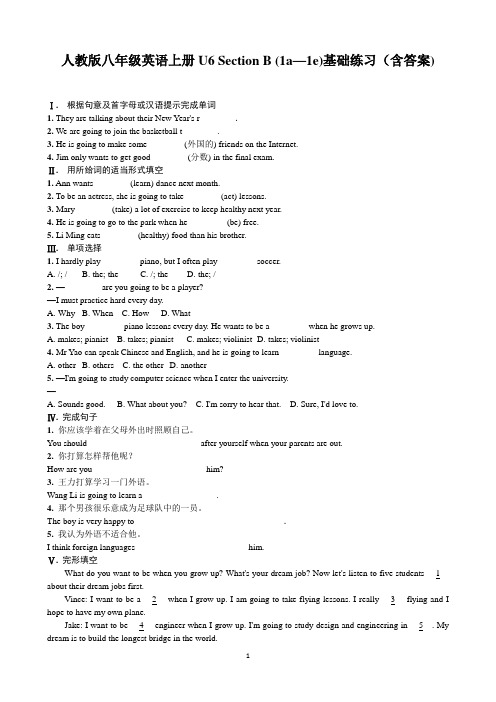
人教版八年级英语上册U6 Section B (1a—1e)基础练习(含答案)Ⅰ. 根据句意及首字母或汉语提示完成单词1. They are talking about their New Year's r________.2. We are going to join the basketball t________.3. He is going to make some ________(外国的) friends on the Internet.4. Jim only wants to get good ________(分数) in the final exam.Ⅱ. 用所给词的适当形式填空1. Ann wants ________(learn) dance next month.2. To be an actress, she is going to take ________(act) lessons.3. Mary ________(take) a lot of exercise to keep healthy next year.4. He is going to go to the park when he ________ (be) free.5. Li Ming eats ________(healthy) food than his brother.Ⅲ. 单项选择1. I hardly play ________ piano, but I often play ________ soccer.A. /; /B. the; theC. /; theD. the; /2.—________ are you going to be a player?—I must practice hard every day.A.WhyB. WhenC. HowD. What3. The boy ________ piano lessons every day. He wants to be a ________ when he grows up.A. makes; pianistB. takes; pianistC. makes; violinistD. takes; violinist4. Mr Yao can speak Chinese and English, and he is going to learn ________ language.A. otherB. othersC. the otherD. another5.—I'm going to study computer science when I enter the university.—________A. Sounds good.B. What about you?C. I'm sorry to hear that.D. Sure, I'd love to.Ⅳ. 完成句子1.你应该学着在父母外出时照顾自己。
人教版go for it八年级英语上册 Unit 6 Section B (1a-1e)【精品课件】
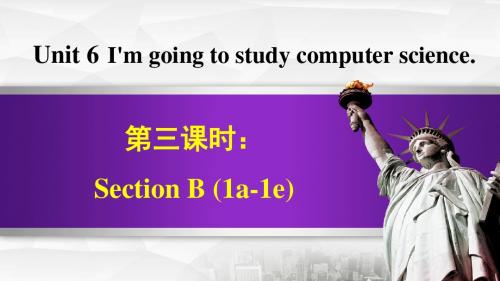
1e
Make a list of other resolutions and how you are going to make them work. Then discuss them with your group.
Mike he is going to go to a soccer camp. He can play soccer every day there.
1d
Kim: Did you make a New Year’s resolution this year, Lucy? Lucy: Yes, Kim, I did. Kim: What are you going to do? Lucy: I’m going to learn to play the piano. Kim: Cool. How are you going to do that? Lucy: I'm going to take piano lessons. How about you? Kim: Well, my New Year’s resolution is to get good grades. Lucy: How are you going to do that?
New Year's Resolutions
Next year,I'm going to:
1.learn to play the piano
2
2.make the soccer team
5
3.get good grades
4 4.eat healthier food
新人教版八年级英语上册 U-6 Section B-1a-1e 优质课件.ppt

3. I’m going to see my teacher on Teachers’ Day. (改为一般疑问句, 并做肯定回答) --_A__re_ _y_o_u_ going to see __y_o_u_rteacher
on Teachers’ Day? --Yes, I am.
5. Friday, what, is, do, going, to, next, he (连词成句) _W__h__a_t _is__h_e_g_o_i_n_g_t_o_d_o__n_e_x_t_F_r_i_d_a_y__?
Exercises
Ⅰ. 请根据汉语提示完成下列句子 每空词数不限
1. Alice and Ben made their __N_e_w__Y_e_a_r_’_s_r_e_so_l_u_t_io_n_s__ (新年决心) yesterday.
2. Please_w__ri_t_e_d_o_w__n (写下)your name!
A: I want to be a teacher. B: How are you going to do that? A: Well, I’m going to study hard and
get good grades. B: Sounds like a good plan. I want to get a lot of exercise.
• 10、人的志向通常和他们的能力成正比例。2020/6/202020/6/202020/6/206/20/2020 2:21:09 PM
• 11、夫学须志也,才须学也,非学无以广才,非志无以成学。2020/6/202020/6/202020/6/20Jun-2020-Jun-20
• 12、越是无能的人,越喜欢挑剔别人的错儿。2020/6/202020/6/202020/6/20Saturday, June 20, 2020
Unit 6 Section B (1a-1e)-八年级英语上册(人教新目标Go For It!)

B: Sounds like a good plan. I want
听起来像
to get a lot of exercise.
Let’s practice
I want to be a violinist. I ’m going to practice violin very hard.
Lucy, who is good at music, is going to learn to play the piano. She is going to _ta_k_e__p_ia_n__o_l_e_ss_o_n_s_. Kim is going to _g_e_t_g_o_o_d__g_r_a_d_e_s._ .To make it work, she _i_s_g_o_i_n_g_t_o_ study hard and do her homework every day. As for Mike, he is going to _m__a_k_e_t_h_e_s_o_c_c_e_r_t_e_a_m_. He thinks it won’t be easy, so he is going to _p_r_a_c_ti_c_e_r_e_a_ll_y_h_a_r_d_. This summer, he _i_s_g_o_i_n_g_t_o_ a soccer camp. He is going to _p_l_a_y_s_o_c_c_e_r_ every day there.
It’s a decision to make a change in your life for the better.
Brain Storm What’s your New Year’s resolutions?
七年级英语下册 Unit 6 I’m watching TV(第3课时)Section B(1a-1

Unit 6 I’m watching TV第三课时Section B (1a-1e)基础知识回顾Ⅰ.用方框中所给词的适当形式填空supermarket,man,shop,pool,drink1.Jane is swimming in the swimming pool .2.I want to go shopping on weekends.3.Mom always goes to the supermarket to buy vegetables(蔬菜).4.—Is that man your father?—No,he is my teacher.5.He is drinking the soup made by his mother.Ⅱ.根据汉语意思完成句子,每空一词1.我妈妈正在超市里购物。
My mother is shopping in the supermarket .2.看!谁在游泳?Look!Who is swimming ?3.我们的朋友们正在图书馆里看书。
Our friends are reading books in the library.4.吉姆今天在学校吗?Is Jim at school today?5.谁在河里玩?Who is playing in the river ?Ⅲ.根据句意及图片提示完成句子,每空一词1.—What are the students doing?—They are cleaning the classroom . 2.—Is Lily playing computer games?—No,she isn’t.She is talking on the phone.3.—What does Mike like to play?—He likes to play football. 4.—Where are they going?—They are going to the park. 5.—Is Mary helping her mom wash the clothes?—Yes ,she is .综合能力提升Ⅰ.单项填空(D)1.—Does your sister like?—Yes,you can see all kinds of clothes in her room.A.readingB.dancingC.singingD.shopping(D)2.—What are you doing?—I.A.eatB.can eatC.eatingD.am eating(D)3.We want this book now.A.readingB.am readingC.readD.to read(A)4.—Let’s go swimming.—.I like swimming very much.A.Sounds goodB.Sure,I’d loveC.SorryD.No(C)5.—you the window?—Yes,I am.A.Do;cleanB.Is;cleaningC.Are;cleaningD.Do;cleaningⅡ.阅读理解It’s late at night.Martin is sitting on his bed and he’s looking at his clock.His neig hbors(邻居) are making a lot of noises and Martin is very angry.The people in Apartment 2 are dancing.The man in Apartment 3 is singing.The woman in Apartment 4 is practicing the violin.The teenagers in Apartment 5 are listening to loud rock music(摇滚乐).The dog in Apartment 6 is barking(吠叫).And the people in Apartment 7 are having a big argument(争吵).It’s very late and Martin is tired and angry.What a terrible night!(A)1.Martin’s neighbors are.A.noisyB.angryC.friendlyD.interesting(B)2.The man in Apartment 3 is.A.dancingB.singingC.sleepingD.moving(A)3.The noisy people in Apartment 5 are.A.youngB.oldC.womenD.men(A)4.The dog in Apartment 6 isn’t.A.sleepingB.making noiseC.noisyD.barking(B)5.The woman in Apartment 4 is.A.practicing the pianoB.practicing the violinC.playing computersD.playing balls如有侵权请联系告知删除,感谢你们的配合!。
Unit6SectionB1a-1e教案人教版英语七年级上册

Unit 6 Section B 1a1e 教学目标To learn some words and expressions about food.To consolidate the structures:Does Tom like carrots?Yes, he does./No, he doesn’t.核心素养To learn some words and expressions about food.重难点To learn some words and expressions about food.To consolidate the structures:Does Tom like carrots?Yes, he does./No, he doesn’t.教学过程Free talkDo you like…for breakfast/lunch/dinner?Does he /she like…for breakfast/lunch/dinner?1a Write the number of each wordnext to the correct food.1.orange 3. eggs 5. icecream 7. banana 9. rice2. salad 4. apple 6. hamburger 8. chicken 10. carrotsI like ...I don’t like...A: Does … like…?B: Yes, he /she does. He/she likes …B: No, he/she doesn’t. He/she doesn’t like …three meals(一日三餐)breakfastWhat do you like for breakfast?I like eggs and milk for breakfast.For breakfast, I like eggs and milk.lunchWhat do you like for lunch?I like chicken and carrots for lunch.For lunch, I like chicken and carrots.What do you think of (你认为……怎么样) the breakfast, lunch and dinner in part 1a?Do you like the breakfast, lunch and dinner? What do you usually have for breakfast, lunch and dinner?I like… I have ______ for breakfast/ lunch/ dinner.How many other words can you add to the lists?fruit: pear, ___________________________________________________________vegetables: __________________________________________________________Listen and circle the food you hear in 1a.1. orange2. salad3. eggs4. apple5. icecream6. hamburger7. banana8. chicken 9. rice 10. carrots1d Listen again. Fill in the chart.Finish the dialogue. Then act it out with your partner.Sally: Do you like carrots?Tom: __________. I like all vegetables.Sally: How about salad? _______________?Tom: Yes, I do. It’s great! Do you likevegetables?Sally: _______________________. Well,only salad. _____________. I likebananas, oranges …Ask and answer questions about what Sally and Tom like and don’t like.Does Tom like carrots?Yes, he does.Does Tom like …?…Work in groupsA:Do you like strawberries for breakfast/lunch/dinner?B:Yes, I do.I like... /No, I don’t.I don’t like…A:Does he/she like strawberries for breakfast/lunch/dinner?C:Yes, he/she does.He/She likes…/No, he/she doesn’t.He/She doesn’t like …GroupworkI like…, but I don’t like ….Report:Eg:Tom likes apples,but he doesn’t like pears.Gina likes oranges,but she doesn’t like salad. Bob likes …,but he doesn’t like …I like…, but I don’t like…Homework1. 用下列句型就你自己的饮食习惯写五到七个句子。
Unit6SectionB(1a_1e)课件人教版英语七年级上册
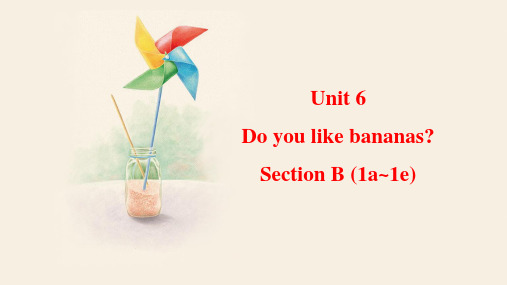
学习目标 新知学习 重点研讨 课堂小结 当堂检测
Pair work
What do you like for
breakfast? lunch?
dinner?
I like...for breakfast / lunch/ dinner.
学习目标 新知学习 重点研讨 课堂小结 当堂检测
1a Write the number of each word next to the correct food.
学习目标 新知学习 重点研讨 课堂小结 当堂检测
(3)have sth. for breakfast/lunch/dinner早(午、晚)餐吃…… eg:I have chicken for lunch.es and rice for dinner. 她晚餐吃蔬菜和米饭。
three chickens三只小鸡
学习目标 新知学习 重点研讨 课堂小结 当堂检测
3. breakfast
名词,意为“早餐”。
4. lunch
名词,意为“午餐”。
5. dinner
名词,意为“晚餐,正餐”。 常用短语: (1)at breakfast/lunch/dinner在吃早(午、晚)餐 (2)have breakfast/lunch/dinner吃早(午、晚)餐 在此短语中breakfast/lunch/dinner前面不能加冠词the或a, 但可以说have a big breakfast, have a quick breakfast。
Unit 6 Do you like bananas?
Section B (1a~1e)
新课 导 入
Free talk
fruit
vegetables
2019年秋苏教版九年级英语上册课件:unit 6 Section B (1a-1e)

探究点二 George wanted to make the customer happy. 乔治想使顾客高兴。 make the customer happy是make的一个固定结构。其结 构为:make+宾+形容词 意为“使某人/物…… e.g.The good news made me excited.这个好消息使我很兴
Step 1 准备与热身(preparation)
What did they eat? Ice-cream. What did the big dog think of the ice-cream? Sweet, cool, and delicious!
How will the bread and snack taste? Sweet and delicious. Can you think of any other flavor? Salty, hot, bitter, sour, fresh …
3. What did the custom order at the restaurant? He ordered a plate of fried potatoes.
4. What did the custom think of the potato chips George cooked at first? He thought they were cut too thick.
1e Make a conversation about the
invention of potato chips. Use
the information in 1c and 1d.
Did you know potato chips were invented by mistake?
人教版英语八年级上册Unit6SectionB(1a1e)优秀教学案例

3.学生能够通过听力练习,提高听力理解能力,并能听懂并运用本节课的核心词汇和句型进行口语交流。
人教版英语八年级上册Unit6SectionB(1a1e)优秀教学案例
一、案例背景
本案例背景以人教版英语八年级上册Unit 6 Section B (1a-1e)为依托,旨在通过优秀教学实践,帮助学生掌握本节课核心词汇和句型,提高听力、口语、阅读和写作技能。本节课主要内容涉及描述过去发生的事情,让学生学会使用一般过去时态。通过对本节课内容的教学,学生能够更好地运用英语进行日常交流,提高语言实际运用能力。
2.引导学生通过讨论、调查、研究等方法,自主解决问题,提高学生的自主学习能力。
3.针对学生的回答,给予及时反馈和引导,帮助学生纠正错误,巩固所学知识。
(三)小组合作
1.划分学习小组,鼓励学生分工合作,共同完成学习任务,如共同完成一个关于过去发生的事情的短文。
2.设计具有挑战性的任务,激发学生合作学习的兴趣,如进行小组辩论、表演等。
2.提问学生:“What did you do yesterday? How was your day? Did you have a good time?”等,引导学生回忆过去的事情,引出本节课的主题。
3.邀请学生分享他们的过去经历,让学生在真实情境中感受和理解一般过去时态的使用。
(二)讲授新知
1.通过对核心词汇和句型的讲解,让学生掌握一般过去时态的构成和用法,如“I played soccer with my friends. We had a picnic yesterday. They visited a museum last week.”等。
Unit 6 Section B 1a-1e

--Does Tom like tomatoes? --Yes, he does.
Does Sally like salad? Yes, she does. She likes salad.
Does Tom like apples?
No, he doesn’t. He doesn’t like apples.
How many words can you add to the lists?
1c Listen and circle the food you hear in
1a.
1. orange 2. salad
3. eggs 4. apple 7. banana
5. ice cream 6. hamburger 8. chicken 9. rice
1. orange 2. salad 3. eggs 4. apple 5. ice cream 6. hamburger 7. banana 8. chicken 9. rice 10. carrots
3 4
7 10 6
1 2 9
8 5
1b
Pairwork
pears, fruit:_________________ ______________________ vegetables: ____________ carrots, ______________________ ______________________
一般疑问句: Does he like pears? 肯定回答: Yes, he does. 否定回答:No, he doesn’t. 划线提问:What does he like?
Does it like …?
- 1、下载文档前请自行甄别文档内容的完整性,平台不提供额外的编辑、内容补充、找答案等附加服务。
- 2、"仅部分预览"的文档,不可在线预览部分如存在完整性等问题,可反馈申请退款(可完整预览的文档不适用该条件!)。
- 3、如文档侵犯您的权益,请联系客服反馈,我们会尽快为您处理(人工客服工作时间:9:00-18:30)。
4. Mary likes fruit salad. (改为一般疑问句) ______ Mary ______ fruit salad?
Does Sally like salad?
Yes, she does.
Does Sally like …? …
Does Sally\Tom like…? Yes, she/he does./ No, she/he doesn’t.
Sally Tom
After talking about their favorite foods, what do you think are healthy foods? Tell us, please.
ask sb. about sth.
11. 晚餐后
________________
12. 我不想变胖。____________________
for breakfast / lunch / dinner
after dinner
I don’t want to be fat.
二、单项选择
1. Wu Ling likes pears but she ___ bananas.
Task 2
Which food do you think is healthy? Check (√)
2a Yes, Maybe or No.
可能、或许
Food
Yes Maybe No
fruit
√
vegetables
√
eggs
√
chicken
√
hamburgers
√
Ice-cream
√
Read the passage and circle the food words. 2b
阅读指导: 首先,快速阅读本文,圈出食物名称的词汇; 然后,精读短文,查找对话中表达好恶的句子,I like / love …与 I don’t like … /… no, they’re not healthy可知,将这些食物按好恶分类。 最后,用 Cindy / She likes …和 Cindy / She doesn’t like … 写出完整的句 子。
7. We have some fruit after dinner. (改为由let开头
的祈使句) L_e_t_’s__h_a_v_e_ some fruit after dinner.
8. Paul likes milk. He doesn’t like bread. (合为一
句)
but
Paul likes milk, ____ he doesn’t like bread.
8
5
10.
carrots
1b How many other words can you add to the lists?
fruit: pears, ___________a_p_p_l_e_s_______b_a_n_a_nas
_________________________________
vegetables: o_r_a_n_g_e_s________w_a_t_e_rm__e_lo_n______
Sports Star Eats Well! David asks about the volleyball star, Cindy Smith, about her eating habits. David: Hello, Cindy. What do you like for breakfast? Cindy: I love fruit. I think it’s healthy.
5. ice-cream 6. hamburger 7. banana
8. chicken 9. rice
10. carrots
1d
Listen again. Fill in the chart.
Likes
Tom carrots salad
Doesn’t like
apples
Sally salad
Knowledge Review
知识回顾
Dictation the words and phases
Let’s chant:
Apple round, apple red Apple juicy, apple sweet Apple, apple, I love you Apple sweet I love to eat Apple round, apple red Apple juice, apple sweet Apple, apple, I love you Apple sweet I love to eat
Task 2
1a
Write the number of each word next to the correct food.
1. orange 2. salad 3. eggs 4.
apple
5. ice-cream 6. hamburger 7.
34
7
10
8. chicken
6ban1ana 9 2 9. rice
David: OK. So what fruit do you like? Do you like bananas?
Cindy: Well, I don’t like bananas. But I
like oranges and apples.
David: What about lunch? Do you like
how/what about
sounds good
Let’s …
7. 体育明星
_______________ sports star
8. 饮食习惯
_______________
9. 询问某人某事
_______________ eating habits
10. 就早/午/晚餐而言
__________________________
salad?
Cindy: Yes, I really like it.
David: Hmm … and do you like hamburgers for dinner?
Cindy: Oh, no, they’re not healthy. I like David: OK. well, one last question — do Cindy: Err … I like ice-cream … but I don’t
一、写出下列词组或句型。
1. 生日晚餐
_______________
2. 下一周
_______________birthday dinner
3. 考虑 4. 怎么样
_______________ _______________next week
5. 听起来不错 6. 让我们
_______________ __________ think about
Free Talk
What do you eat for breakfast? What do you eat for lunch? What do you eat for dinner? Which do you think is healthy food? Which do you think is unhealthy food?
5. ThDeoyeliske bananaslikfoer dinner. (改为否定句) They _____ ____ bananas for dinner.
don’t like
6. — Does your sister like oranges? (作否定回答) —N__o_, _s_h__e_ _d_o__e_s_n_’t.
— Sounds good.
A. like
B. have
C. find
三、句型转换 1. He eats chicken every day. (改为一般疑问句)
_Do_es____eaht e ______ chicken every day?
2. Tom has hamburgers for dinner.(改为否定句) Tom _do_es_n’_t _ha_ve_ _____ hamburgers for dinner.
A. likes B. don’t like C. doesn’t like
2. — _____ your brothers like hamburgers?
— Yes, ______.
A. Do; they do
B. Does; he does
C. Are; they are
3. We don’t have ______. Let’s go and buy(买) some tomatoes and carrots.
chicken for dinner. you eat ice-cream after dinner? eat it. I don’t want to be fat.
Write five sentences about Cindy’s eating habits.
2c
Cindy likes healthy food. 1. Cindy _lo_ve_s _fru_it.__________________________ 2. She _lik_es_o_ra_ng_e_s a_n_d b_a_na_na_s_. ___________________ 3. She _lik_es_s_al_ad_fo_r_lun_c_h._______________________ 4. Cindy doesn’t _lik_e_ha_m_bu_rg_er_s _for_d_in_ne_r. ___________ 5. She doesn’t _ea_t _ice_-c_re_am__aft_er_d_inn_e_r. _____________
